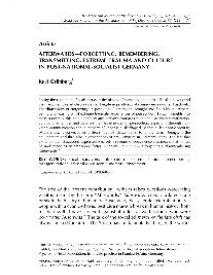Afterwards—Forgetting, Remembering, Transmitting : Extreme Trauma and Culture in Post-National-Socialist Germany
Facing the rupture the Shoah marks in the history of humanity and in the life of survivors and their relatives, this article approaches long-term psychosocial consequences—after Auschwitz. The dimensions of “forgetting” in post-Nazi Germany are brought into focus by the remembering and passing on of extreme traumatic experiences of persecution.
To gain insights into these processes, this article differentiates between traumatization and extreme traumatization. Survivors remember and pass on their experiences of persecution, especially through non-verbal communication and in the form of unconsciously shaped “scenes.” This Scenic Memory of the Shoah is conveyed in relationships with descendants, to fellow human beings, to the environment and thus also in experiences of anti-Semitism in Germany today. The fact that extreme traumatization is expressed precisely in scenes of coexistence also means that it must be understood as an embedded factor in society, in culture—in forgetting and remembering “afterwards.”
Geachte bezoeker,
De informatie die u nu opvraagt, kan door psychotraumanet niet aan u worden getoond. Dit kan verschillende redenen hebben,
waarvan (bescherming van het) auteursrecht de meeste voorkomende is. Wanneer het mogelijk is om u door te verwijzen naar de bron
van deze informatie, dan ziet u hier onder een link naar die plek.
Als er geen link staat, kunt u contact opnemen met de bibliotheek,
die u verder op weg kan helpen.
Met vriendelijke groet,
Het psychotraumanet-team.
In: American Journal of Psychoanalysis ; ISSN: 0002-9548 | 82 | 405-425
https://link.springer.com/article/10.1057/s11231-022-09368-5


